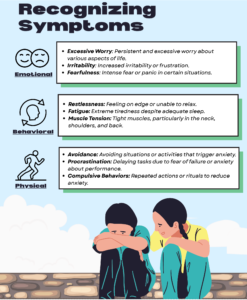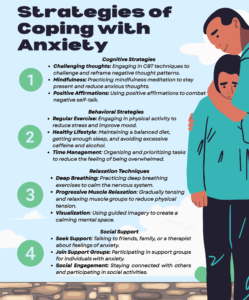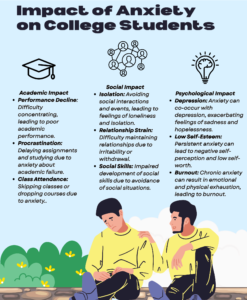Anxiety is a natural and often beneficial response to stress, helping individuals respond to potential threats. However, when anxiety becomes chronic or overwhelming, it can significantly impair daily functioning. It becomes a disorder when these feelings are excessive, persistent, and interfere with daily life. Anxiety is a prevalent issue among college students. According to the American College Health Association, nearly 63% of college students experienced overwhelming anxiety in the past year. Research indicates that academic pressure, social challenges, and the transition to independence contribute significantly to high anxiety levels in this population.
The symptoms of anxiety can be both psychological and physical. Common symptoms include persistent worry, restlessness, difficulty concentrating, irritability, muscle tension, and sleep disturbances. Socially, anxiety can lead to isolation and withdrawal, as students may avoid social interactions or activities due to fear or nervousness. Academically, anxiety can impair concentration, memory, and test performance, leading to lower grades and decreased academic achievement. Psychologically, chronic anxiety can contribute to feelings of hopelessness, decreased self-esteem, and an increased risk of developing depression.
Recognizing Symptoms of Anxiety
Emotional Symptoms
- Excessive Worry: Persistent and excessive worry about various aspects of life.
- Irritability: Increased irritability or frustration.
- Fearfulness: Intense fear or panic in certain situations.
Physical Symptoms
- Restlessness: Feeling on edge or unable to relax.
- Fatigue: Extreme tiredness despite adequate sleep.
- Muscle Tension: Tight muscles, particularly in the neck, shoulders, and back.
- Sleep Disturbances: Difficulty falling asleep, staying asleep, or experiencing restful sleep.
- Palpitations: Rapid or irregular heartbeat.
- Sweating: Excessive sweating, even in non-stressful situations.
Behavioral Symptoms
- Avoidance: Avoiding situations or activities that trigger anxiety.
- Procrastination: Delaying tasks due to fear of failure or anxiety about performance.
- Compulsive Behaviors: Repeated actions or rituals to reduce anxiety.
Strategies to Cope with Anxiety
Cognitive Strategies
- Challenging thoughts: Engaging in CBT techniques to challenge and reframe negative thought patterns.
- Mindfulness: Practicing mindfulness meditation to stay present and reduce anxious thoughts.
- Positive Affirmations: Using positive affirmations to combat negative self-talk.
Behavioral Strategies
- Regular Exercise: Engaging in physical activity to reduce stress and improve mood.
- Healthy Lifestyle: Maintaining a balanced diet, getting enough sleep, and avoiding excessive caffeine and alcohol.
- Time Management: Organizing and prioritizing tasks to reduce the feeling of being overwhelmed.
Relaxation Techniques
- Deep Breathing: Practicing deep breathing exercises to calm the nervous system.
- Progressive Muscle Relaxation: Gradually tensing and relaxing muscle groups to reduce physical tension.
- Visualization: Using guided imagery to create a calming mental space.
Social Support
- Seek Support: Talking to friends, family, or a therapist about feelings of anxiety.
- Join Support Groups: Participating in support groups for individuals with anxiety.
- Social Engagement: Staying connected with others and participating in social activities.
Impact of Anxiety on College Students
Social Impact
- Isolation: Avoiding social interactions and events, leading to feelings of loneliness and isolation.
- Relationship Strain: Difficulty maintaining relationships due to irritability or withdrawal.
- Social Skills: Impaired development of social skills due to avoidance of social situations.
Academic Impact
- Performance Decline: Difficulty concentrating, leading to poor academic performance.
- Procrastination: Delaying assignments and studying due to anxiety about academic failure.
- Class Attendance: Skipping classes or dropping courses due to anxiety.
Psychological Impact
- Depression: Anxiety can co-occur with depression, exacerbating feelings of sadness and hopelessness.
- Low Self-Esteem: Persistent anxiety can lead to negative self-perception and low self-worth.
- Burnout: Chronic anxiety can result in emotional and physical exhaustion, leading to burnout.



